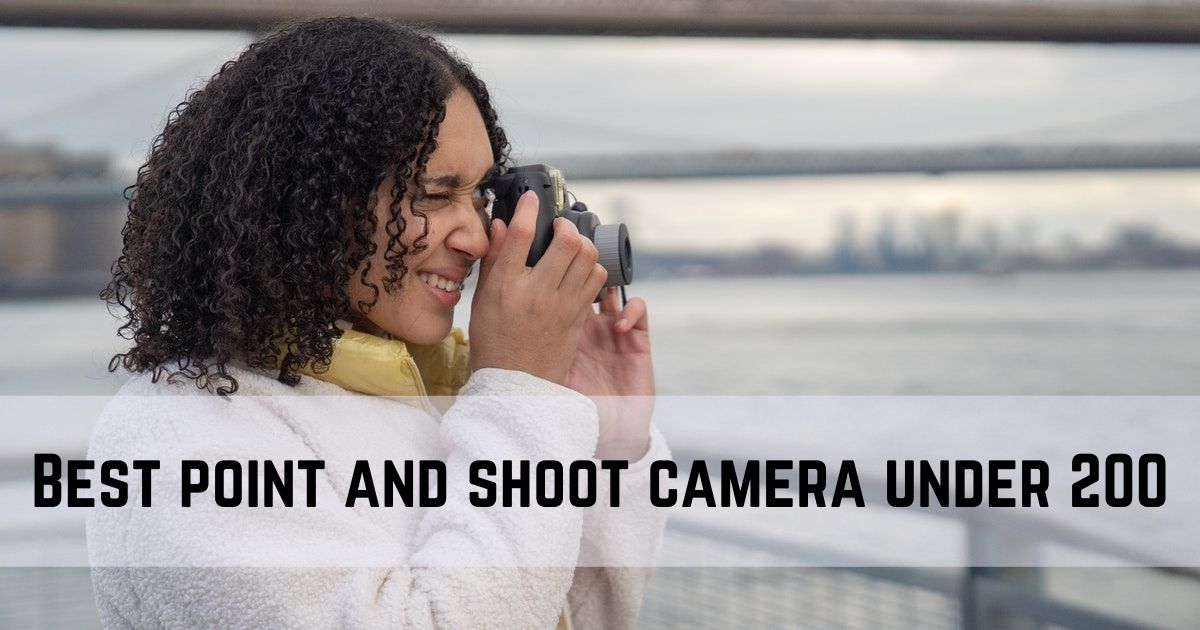
15 Best Point and Shoot Camera Under 200 in 2023
Digital photography innovation made significant progress in the past few years, which eventually implies more preferable and better compact cameras are continually flooding the market. That is incredible information for anybody hoping to buy a decent camera with loads of extraordinary features.
People who have less than a $200 financial plan for a digital camera are searching for something that has preferred picture quality and other advanced features can easily get one.
So in this article, we have listed the best point-and-shoot camera under $200.
1. Canon PowerShot ELPH 360 HS
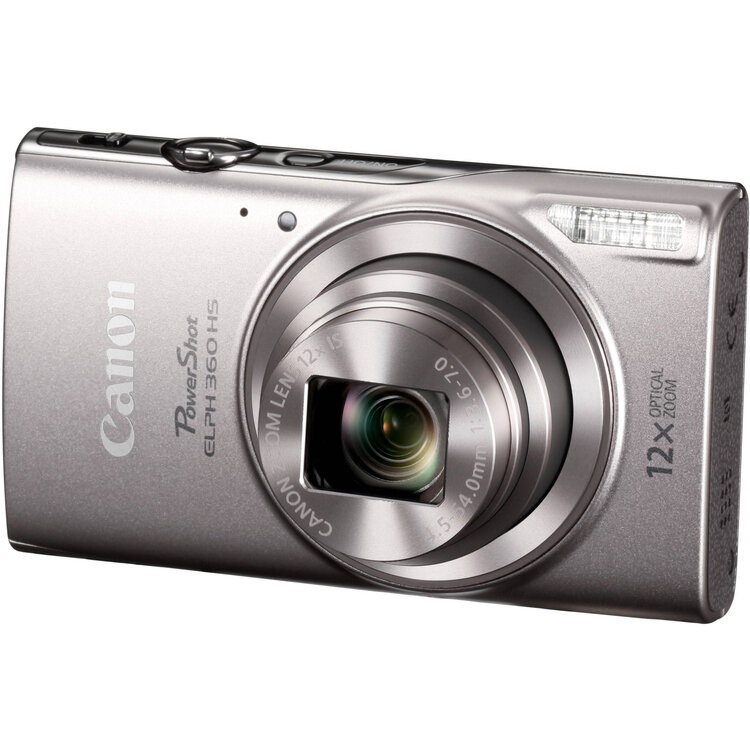
Canon has a long history of making very much fabricated, attractive compared to the other compact cameras. While the Canon PowerShot ELPH 360 HS is certainly not an ideal all-around entertainer, it’s still up there with the best digital cameras under $200.
Lodging a 12x optical long-range focal point with an optical image stabilizer in a little, thin body is no mean accomplishment. For the individuals who don’t have the foggiest idea, ‘optical’ zoom instead of ‘advanced’ zoom implies that the digital camera is utilizing a focal point to do the zooming as opposed to the camera programming essentially ‘trimming’ the computerized picture. Optical zoom is in every case better quality.
A 12x optical zoom equates to around a 25-300mm focal point on a 35mm digital camera, implying that you can go from the wide plot (for shots of huge gatherings, wide all-encompassing vistas, and city-scapes, for instance), as far as possible up to far off shots of natural life.
The gap scope of f/3.6-7 doesn’t make the focal point on the Canon PowerShot ELPH 360 HS especially ‘quick’ (for example one that can allow in a ton of normal light), yet the optical image stabilizer assists you with accomplishing a more honed picture when the sun starts to set.
Just as expanding the opening and bringing down the screen speed, the third piece of the openness triangle is ISO, which when expanded, gets all the lighter to the image sensor. The Canon PowerShot ELPH 360 HS upholds ISO up to 3200, yet similarly, as with all point and shoot cameras under $200, commotion turns into an issue with pictures took shots at ISO 800 and upwards.
The 20.2-Megapixel CMOS sensor joins with the DIGIC 4+ Image Processor gives the Canon PowerShot ELPH 360 HS more resolution than other more costly point and shoot cameras.
Outdoor shooting in great light is the place where the Canon PowerShot ELPH 360 HS sparkles, delivering fresh, distinctive photographs that look extraordinary when seen huge on PC screens.
Pros of Canon PowerShot ELPH 360 HS:
- Light body
- Face Detection Focusing
- 24mm Wide-Angle lens
- Manual Focusing
- 20.0MP High-Resolution image sensor
- Full HD Video
- Built-in Wireless connectivity
Cons of Canon PowerShot ELPH 360 HS:
- Low Battery Life
- No Environmental Sealing
2. Fuji FinePix XP90
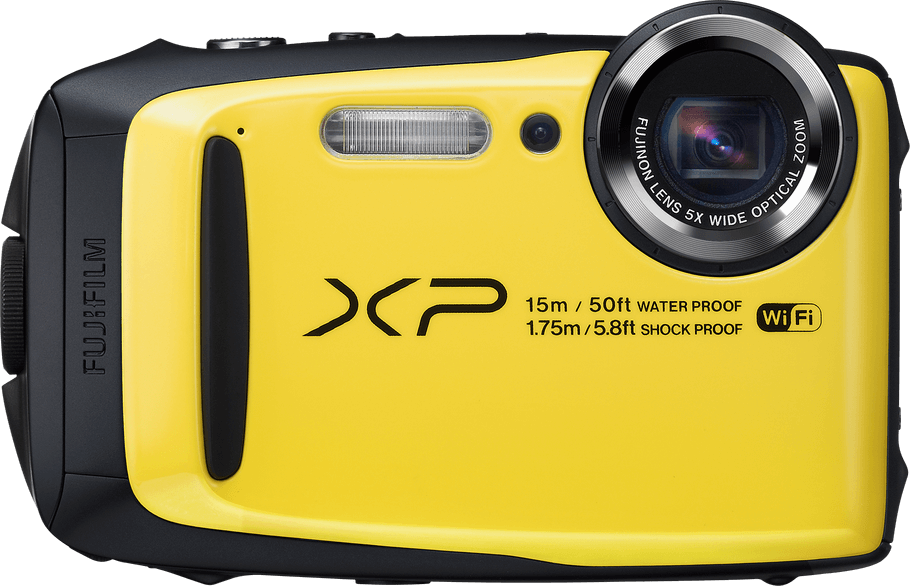
Fuji is one more solid competitor in the point and shoot camera classification, pulling from long stretches of involvement with the entertainment world making the top-notch point and shoot cameras under 200. This little Fuji FinePix XP90 anyway brings something new to the table – to be specific its capacity to shoot submerged.
The plastic quality on the Fuji FinePix XP90 is fantastic. The nice measured front finger grasp and finished thumb lay on the rear of this point and shoot camera make the Fuji FinePix XP90 agreeable to hold and give sufficient grasp to utilize it unhesitatingly submerged.
This underwater digital camera market is a little one, and observing one be under $200 lessens it further. Fortunately, the Fuji FinePix XP90 carries with it the uncommon mix of nice picture quality, taking care of and in general execution with the capacity to be utilized to profundities up to 15m.
Described by fast handling, the CMOS sensor in the Fuji FinePix XP90 powers the constant shooting at up to 10 edges/sec. (max. 10 edges) or ultra-high velocity blasts at a most extreme 60 casings/sec. (max. 70 edges at 16:9).
The splendid, 3-inch screen is a welcome expansion to the Fuji FinePix XP90, highlighting an enemy of intelligent covering, permitting it to be seen in the brilliant sun and submerged. The brilliance is naturally changed because of the lighting conditions to keep up with ideal permeability while forestalling superfluous battery channels.
Having an optical zoom in this digital camera under $200 is noteworthy, with a scope of 28-140mm implying that the Fuji FinePix XP90 can be utilized for very close wide point shots just as long reach zoomed shots.
By downloading the Fuji Camera Remote application to your Android phone, you can distantly control the Fuji FinePix XP90 and move photographs remotely.
Pros of Fuji FinePix XP90:
- 16-megapixel image sensor
- Optical image stabilization
- 28mm wide-angle lens
- Waterproof/freezeproof/shock proof
- 1080p video at 60/30fps
- Time-lapse mode
- Wi-Fi built-in
- Up to 10fps continuous shooting
Cons of Fuji FinePix XP90:
- Needs improvement in the performance at high ISO
3. Sony Cyber-shot DSC-W830
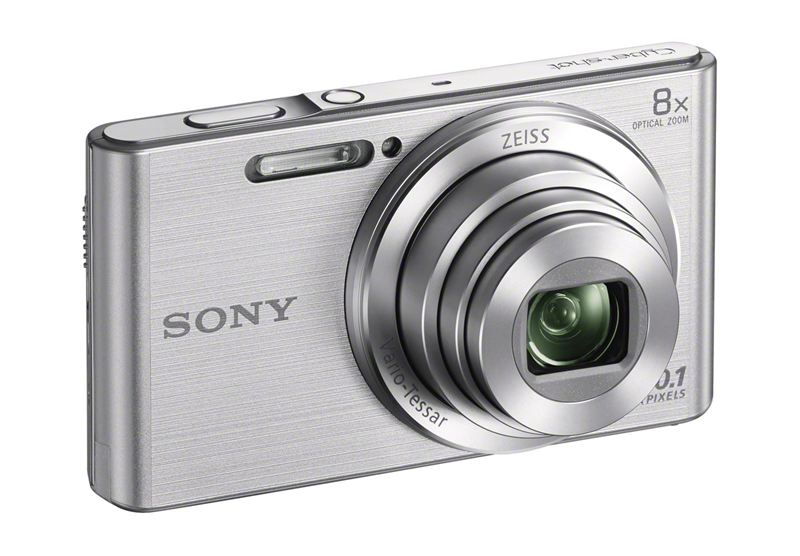
With an incredible 20 MP CCD sensor, the Sony Cyber-shot DSC-W830 has come into the competition with a mix of elements that appear to be practically great! This compact camera includes a promising 8x optical zoom that is a critical redesign from more established firms. The image sensor gives a user-friendly picture quality that is ensured to wow the clients.
Picture adjustment is an amazing element to have in your digital camera as it compensates for temperamental hands and moving subjects. The best part about the DSC-W830 is maybe the conservative size and strong form nature of this compact camera. It’s little enough to squeeze into your pocket or tote and is adequately strong to accept moderate pressing factors too.
The 2.7-inch LCD screen is perfect to oblige the size of this compact camera. The screen has 230k dabs and is extraordinary for indoor use as it is very striking and brilliant. On this digital camera, you will track down a shade discharge and a switch that permits the clients to control the optical zoom highlight.
A glimmer is situated on the facade of the compact camera directly on the upper side of the focal point. The blaze may be small, however, it has a scope of 3.2 meters when set with the wide-point mode. This probably won’t be stunning, however, at the cost range, it’s very great. As it is more than equipped for lighting up very close-reach subjects.
With the ceaseless shooting limit of 1 FPS, it has a reliable speed of 100 exact shots, giving you will continue to press the shade for that long. The compact camera can furnish 4K pictures with an ISO affectability scope of 80 – 3200, making this camera particularly useful for representation shots.
Pros of Sony Cyber-shot DSC-W830:
- Panorama Shooting
- 2.7″ Fixed Type Screen
- HD – 1280 x 720 video
- Face Detection Focusing
- 35mm wide-angle lens
- Image Stabilization
- Easy to carry
Cons of Sony Cyber-shot DSC-W830:
- No Environmental Sealing
- No Built-in Viewfinder
4. Kodak AZ361-WH PIXPRO Astro
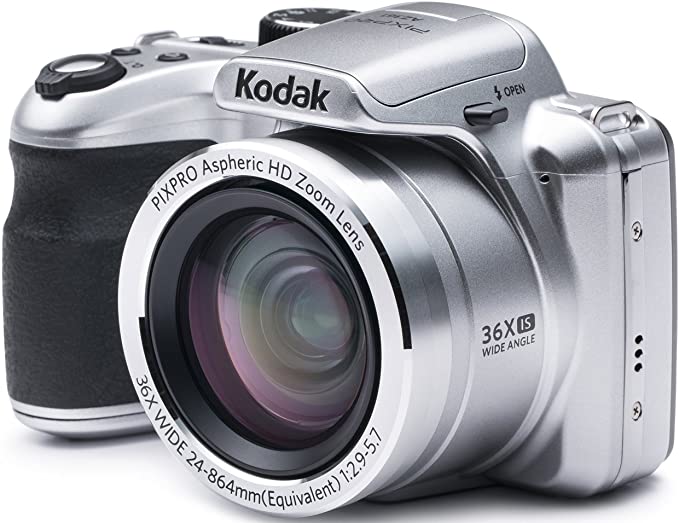
The Kodak AZ361-WH PIXPRO Astro consolidates a 16 MP 1/2.3 inch CCD image sensor with an optical long range focal point that reaches from 24mm to 864mm, so this camera captures images, design, and scenes just as zooming in for firmly engaged activity shots or for nature photography that allows you to get wild creatures and birds without upsetting them. With full-scale mode, you can shoot from as close as 5 cm.
Notwithstanding the scene modes, the Kodak AZ361 offers separate pet representation modes for canines and felines, a mode for capturing messages, a mode for taking ID photos, a mode for shooting within an exhibition hall, and a mode for shooting through glass.
It can shoot scenes up to 180°, and in panning mode, you can container to follow a quick article, making an obscured foundation that exhibits the development and speed. The ISO affectability settings range from 80 to 3200, covering practically all lighting conditions. So it is considered one of the best cameras.
Like the ELPH 190 and 360, you can take full manual control of the AZ361 Astro. In contrast to any of the above point-and-shoot cameras under 200, however, you can make and save your custom setting.
Along these lines, you will be taking many pictures under genuinely predictable lighting and visual conditions, when you track down the ideal setting for that scene, you can save those settings and, when you’re prepared to take more pictures, you would then be able to choose your custom setting similarly as you would a scene mode.
The Kodak Astro utilizes Kodak’s optical picture adjustment framework. It catches pictures in JPEG format and instant film at a resolution of 720p. With an Eye-fi SD card, which you should buy independently, the Kodak Astro can print to PictBridge printers and transfer pictures and films to the web.
Pros of Kodak AZ361-WH PIXPRO Astro:
- 16.15 megapixel CCD sensor
- Optical image stabilization
- Full manual controls
- 720p HD video recording
- ISO 80-3200
- 180º panorama mode
Cons of Kodak AZ361-WH PIXPRO Astro:
- Lacks RAW format
5. Nikon Coolpix S7000
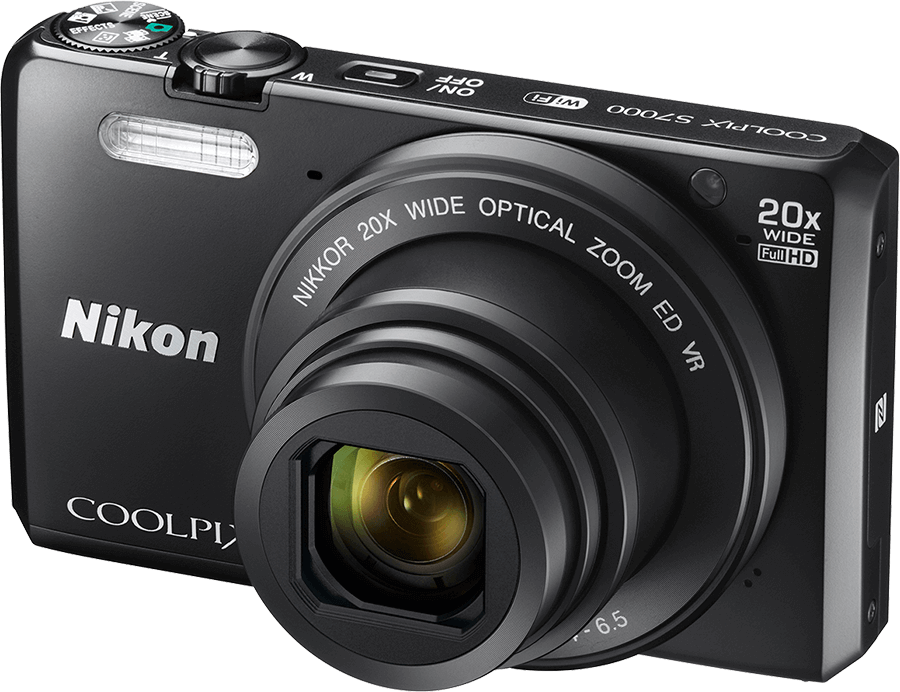
Nikon is one more huge name in the camera world, yet it must be said that its pocket point and shoot cameras are a bit of a hodgepodge. Several champions like the ones on this list of the best point and shoot cameras under 200, there’s been a couple of lemon in transit as well.
The COOLPIX S7000’s 20x optical zoom lens goes from wide-angle, which means around 25 to an incredible 500mm of identical zoom on a greater camera.
This implies you can take a gathering photograph of your more distant family, then, at that point in one hold of the zoom button, snap a picture of a bird in flight 100m away! A zoom range on a camera this little and moderate is truly noteworthy.
Talking about colors, you can get the Coolpix in dark, white, pink, and gold.
Shooting just JPG permits the Nikon Coolpix S7000 to deal with pictures rapidly, and implies you can undoubtedly move the photos using the SnapBridge Wi-Fi and NFC innovation direct to your cell phones.
Reasonable digital cameras in this class regularly incorporate various in-camera embellishments, and the Nikon Coolpix S7000 is the same. Nonetheless, the 18 scene modes you’ll observe be generally helpful, permitting you to take great photographs easily, in any case, testing circumstances – seashore, snow, night, dusk, and more.
Concerning low light execution without the inbuilt blaze, the Nikon Coolpix S7000 battles above ISO 800, however, this is typical for a camera costing under 200 dollars. How long your scene is sufficiently lit, the camera works effectively with its little sensor size.
Combined with the 20x zoom, you’ll have some good times selecting fast-moving objects somewhere far off to photo cautiously.
Pros of Nikon Coolpix S7000:
- 16 megapixel BSI CMOS sensor
- Inbuilt Wi-Fi & NFC
- 1cm macro mode
- Pocketable camera
- Time-lapse mode
- FullHD Video
- Vibration reduction
- A variety of color options
Cons of Nikon Coolpix S7000:
- No touchscreen
6. Canon PowerShot ELPH 190
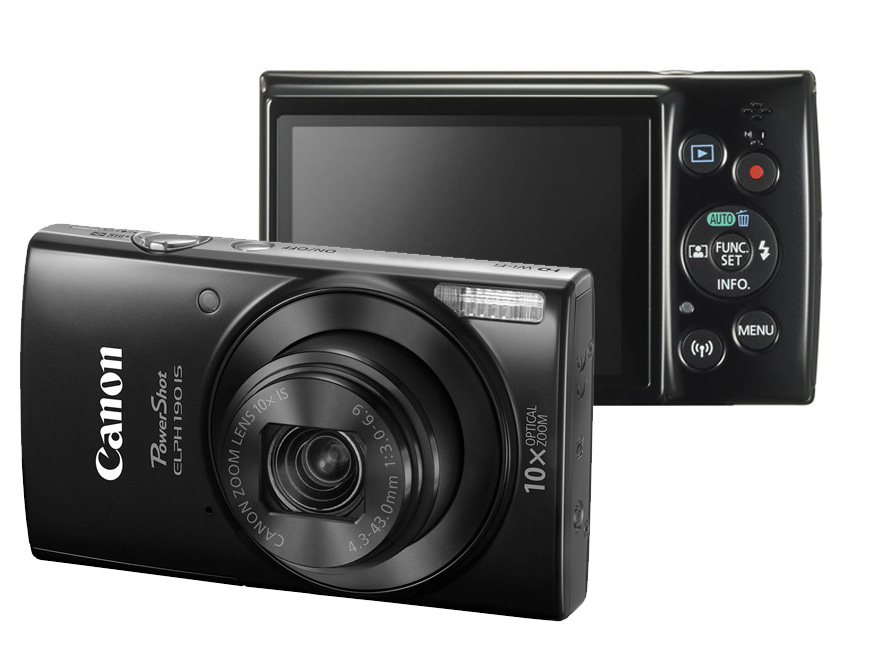
This point and shoot camera merited a spot here on account of the value versus execution bend. This brand has progressed significantly in the street to creating spending best point-and-shoot Canon cameras that are especially fit to eclipse the opposition.
This little pocket-sized camera here is a reexamined improvement of the ELPH 180. How about we discuss more what this camera offers!
To each photographic artist, both basic and complex, the digital zoom highlight is exceptionally fundamental. Also, the ELPH 190 has increased its game by expanding to 10x optical zoom from 8x, giving you a more clear perspective regarding your matter with better effectiveness and adaptability.
Besides the optical zoom, you get an extra element of 4x advanced digital zoom. Two felines have been taken care of for any individual who is an enthusiast of double zoom alternatives.
For the DIGI 4+ Image processor and a noteworthy 20 MP advanced camera, it hasn’t changed a great deal nor has the 720p video limit. However, the measurements have improved alongside the ergonomics of the camera with the estimations of (W x H x D) 3.75 x 2.24 x 0.93 in. /95.3 x 56.8 x 23.6mm.
Regardless of the fundamental elements, you get a “Scene Mode” alternative. This allows you to explore through the Fish Eye impact, Toy Camera impact, and monochrome to catch your photographs according to alternate points of view.
Also, this best point and shoot camera is activity cordial and handles temperatures up to 32-104°F/0-40°C and the working mugginess levels are 10-90%.
With different upgrades from the past variant, the general plan and magnificent components do settle on the ELPH 190 a captivating decision for the individuals who need to purchase another smaller camera for some extraordinary spending photography.
Pros of Canon PowerShot ELPH 190:
- Optical stabilization
- Affordable price bracket
- Face Detection Focusing
- Three color options
- Beautiful scene modes
- Light body
- Built-in Wireless Connectivity
Cons of Canon PowerShot ELPH 190:
- Slow continuous shooting
- Video limited to 720p
7. Samsung WB350F
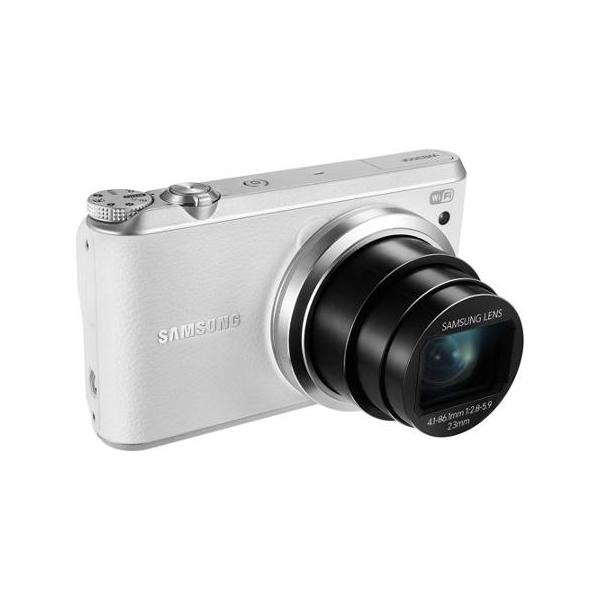
The Samsung WB350F is the most innovatively progressed multitude of digital cameras under $200, and thusly, merits its spot in this article.
When associated with a remote organization with a Windows PC on it, you can set up Samsung’s I-Launcher programming so every photograph you take with the Samsung WB350F is naturally supported up remotely by the ‘Auto Share’ highlight.
MobileLink allows you to move photographs from a cell phone or send records from this point-and-shoot camera to at least one cell phone. The Remote Viewfinder transforms your cell phone or tablet into a viewfinder, permitting you to move the Samsung WB350F’s long-range focal point just as hit the screen discharge.
Aside from noteworthy remote innovation, the Samsung WB350F holds its own with regards to genuine picture-taking as well. The 16.3 megapixel rear enlightened CMOS sensor needs less light for legitimate openness and speedy concentration than customary sensors. This permits you to take appropriately uncovered pictures in low-light circumstances.
The 21x optical zoom gives you a compelling scope of 23-483mm – an enormously noteworthy accomplishment for any minimal camera under $200. There’s no in-assembled optical picture adjustment, however, so you’ll be in acceptable light and have a consistent hand when taking shots at the more drawn-out finish of the digital zoom range.
The touch screen usefulness on the Samsung is additionally welcome incorporation, and something not seen on any of the other point and shoot cameras under $200 in this list.
Another element that ought to be referenced, but a fairly abstract one, is the vibes of the Samsung WB350F. Enlivened by vintage camera plans, the smooth bends of this conservative camera joined with a false level external (accessible in 5 tones!), will speak to the style cognizant picture takers out there.
Pros of Samsung WB350F:
- Sharp, 21x optical zoom lens
- Wide-angle lens
- Touch-screen display
- Excellent Wi-Fi implementation
- Manual Exposure
- Excellent shutter speed
- Panorama Shooting
Cons of Samsung WB350F:
- Limited burst shooting
- No Environmental Sealing
8. Panasonic Lumix DMC-TS30
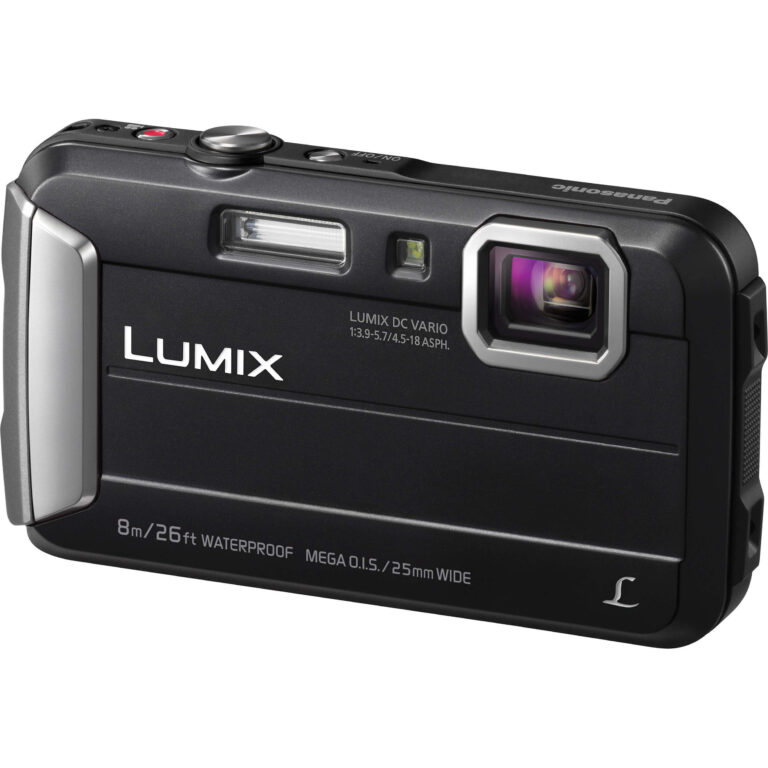
The Lumix DMC-TS30 is made for individuals who incline toward a functioning way of life and aren’t reluctant to plunge profound. This camera is waterproof up to 8 meters. Assuming you are a swashbuckler, I ensure that this is one of the most amazing point-at-shoot cameras under 200. A Lumix DC Vario lens offers focal lengths from wide-angle to telephoto at 25-100mm in 35mm format. So it is considered one of the best cameras.
This one amazing extreme gadget is all around secured by plan against shock, residue, and freezing as well. Leave it alone – 10 Degree Celsius temps or a drop from up to 5 feet, this camera can deal with everything.
The strong form of its image quality is amazing, yet the mega O.I.S camera focal point gives lucidity and excellence to the group photos you take, regardless of whether you have unsteady hands. Indeed, kids and the older can utilize this minibeast to their souls’ substance.
The Lumix DMC-TS30 has got your back with regards to crisis stockpiling needs too. Indeed, it gave me a 220 Mb reinforcement when I ran out of outside memory. You will see it helpful also. This interior memory can store around 34 pictures!
Time-slip by provisions to even a torchlight, this point-and-shoot camera has checked all the containers of an important involvement with submerged plunging. There are some extra methods of the camera that incorporate Sports, Snow, and Beach, and Snorkeling.
The torchlight can be valuable in enlightening dull tents in any event when the camera highlights are wound down.
I ought to likewise caution you that this point-and-shoot camera is equipped for submerged shooting. Be that as it may, it’s for a restricted measure of time. Plus or minus an hour. Other than that, this awesome little gadget surpasses all assumptions at its value range and is certainly a decent purchase.
Pros of Panasonic Lumix DMC-TS30:
- Water Proof and Shockproof
- Environmental Sealing
- Face Detection Focusing
- Timelapse Loop Recording
- Great image quality
- Lightweight to carry
- 1.3 fps continuous shooting
Cons of Panasonic Lumix DMC-TS30:
- No External Flash Shoe
- No RAW Shooting
9. YI 4K Action Camera
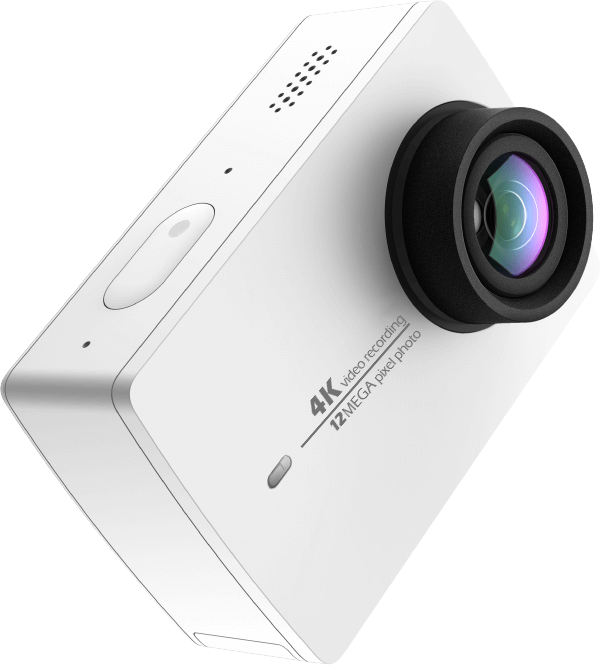
The YI 4K Action shoot camera offers the touchscreen of the GoPro Hero 4 Silver, and the 4k video of the GoPro Hero 4 Black, and effectively beats both on cost. It is one of the best action cameras. The touchscreen is ‘Gorilla Glass Retina’, which means it resists scratches and everyday sway and is viewable from a 160-degree point.
Controlling and setting up the YI 4K Action shoot camera is simple on account of its well-thought-out menu framework and contact screen activity. Like the GoPro, you can likewise download a free application to do everything using your keen gadget.
There are a lot of client correlations of the YI 4K Action shoot camera to the GoPro comparable with regards to video, and the Chinese brand normally arises successfully. The equivalent is by all accounts valid with image quality.
The sensor can catch 12mp stills through an f/2.8 opening focal point joined with 3-pivot electronic picture adjustment, which means sufficient JPGs that can be messed with sometime later utilizing Lightroom or comparable picture editors.
The image quality out of these small activity camcorders will consistently linger behind the top-of-the-line smartphones, yet individuals don’t accept these things for the picture quality.
Survey the super wide-point pictures that emerge from the YI 4K Action shoot camera will carry a grin to your face. Regardless of whether it’s the amusing contortion when shooting individuals very close, or the vivid impact of a general all-encompassing vista, there’s essentially nothing similar to seeing life at 155 degrees!
The incorporation of the YI 4K Action Camera in this gathering of the best cameras under $200 was maybe a strange one, however since it’s an all-around GoPro mixer at a moderate value.
Pros of YI 4K Action Camera:
- 4K video at 30fps
- Weighs just 94g
- 155° wide-angle lens
- Beautiful scene modes
- Great image quality
- Relatively affordable
- Solid performance
Cons of YI 4K Action Camera:
- Image stabilization could be better
10. Fuji Instax Mini 8
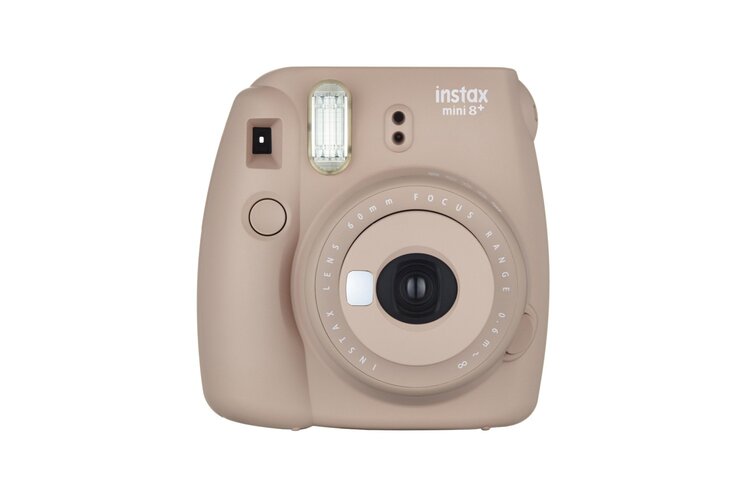
The Fuji Instax Mini 8 is an affordable camera that you can get for under $200. It additionally has multi-shaded choices (pink, white, yellow, dim blue, child blue, red, white, and dark!), various shooting modes, and fun structure factors make this little moment instant film camera quite possibly the most mainstream at any point made.
As you’d expect, the catches and elements on the Fuji Instax Mini 8 are extremely fundamental. This camera is pointed after all at the youthful teen market, however that doesn’t imply that picture takers of all ages can’t partake in the straightforwardness as well.
There are five distinct openness levels for you to look over. Indeed, even those with no photography experience will want to comprehend the symbols displayed around the focal point of the Fuji Instax Mini 8.
The gap opens to f/12.7, not wide by any principles, however sufficiently wide to let somewhat surrounding light in for party photographs. The proper shade speed of 1/60 will likewise help in such a manner.
With no self-timer, you’ll need to draw near to your subject to shoot – somewhere in the range of 60cm and 270cm to be accurate. The Fuji Instax Mini 8 is unmistakably a group camera, made to shoot faces, chest area, and when necessary, full-body if you can in any case stay close.
The Fuji Instax Mini 8 assumes a similar acknowledgment card size 62 x 46mm Instax film as the other instant cameras in the series. Purchasing the instant film in mass is the least expensive approach to do it, however, you’ll know about the expense per shot.
It’s no big surprise the Fuji Instax Mini 8 is perhaps the most well-known present for photography enthusiasts and the youngsters out there – it’s modest, fun, or more all, can be the addictive substance to different types of photography later on.
Pros of Fuji Instax Mini 8:
- Great performance
- Inexpensive
- Bright optical viewfinder
- Relatively affordable instant film
- Variety of color options
- Uses AA batteries
Cons of Fuji Instax Mini 8:
- No selfie mirror
- Limited close focus
11. Fujifilm FinePix XP140
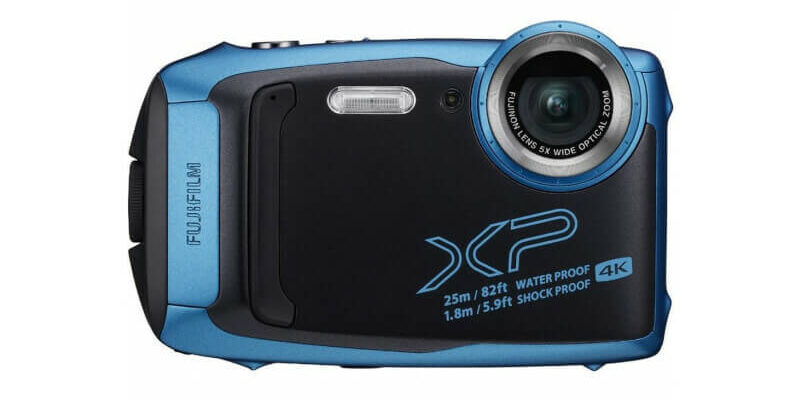
This best point-and-shoot camera has a very refined light-catching limit as the dark blue can get dim now and again. You will be awed by how quick the shade speed of this camera is.
Not just that, this thing has a stunning shock-engrossing limit, 5.9 feet to be precise. In this way, it ought to stay safe by typical drops from the hand.
The optical sensor resolution is 16 Megapixels. What’s more, there is an in-assembled viewfinder innovation that is fixed to the LCD. The showcase screen is 3-inch thick and it is sufficient to look hard and long at the subject you are going to catch.
The grin Shutter button does precisely that. Confidence in the camera since it is customized to help you not miss a significant shot. Submerged experiences are deficient without high res recordings that wonder the surface occupants.
You can catch the submerged world with 15 edges each second in 4K/Ultra HD! the camera will offer quality that is difficult to oppose and the lay relies upon the jumper’s photography abilities.
Document sharing should be possible without getting entrapped by wires because the XP140 accompanies Bluetooth support. You can move records to cell phones and tablets with a further developed blending alternative.
This load of components makes the FujiFilm Finepix XP140 unquestionably one of the most amazing underwater compact cameras out there when you consider the value you need to pay for it.
Pros of Fujifilm FinePix XP140:
- Low price
- Easy to use
- Outstanding image quality
- Stylish look
- Great shutter speed
- ISO 100-12800
- Waterproof camera
Cons of Fujifilm FinePix XP140:
- No manual modes
12. GoPro HERO Session
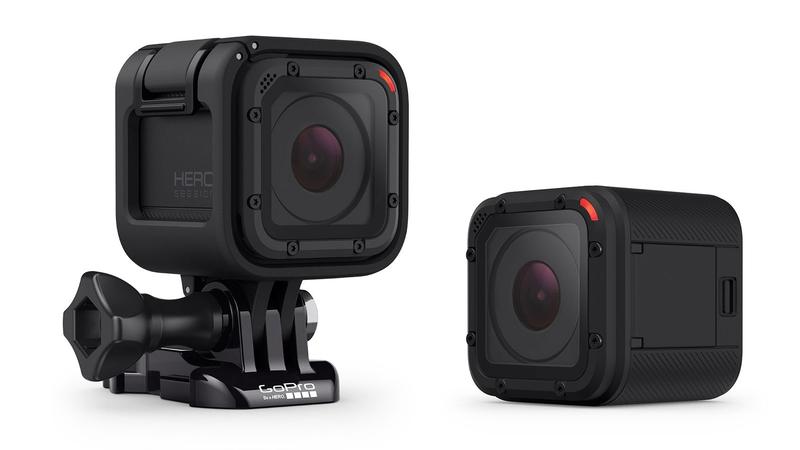
On the minuscule 1.5″ block of the GoPro HERO Session, you’ll discover only 2 buttons and a little LCD board. There’s an enormous record button that is effectively operable while wearing gloves (useful for Joe on his snowboard trip!), and a little Wifi button on the back. Squeezing the record button starts and stops the video, and holding it down begins a period pass.
Regardless of all the simplicity in operation of the GoPro HERO Session, a few clients like to make changes to the settings utilizing their keen gadgets and the astounding GoPro application.
The LCD on the highest point of the unit shows every one of the typical significant information, and a little switch on the unit uncovers the miniature SD card opening and miniature USB port – the same old thing there, however, you can’t resist the urge to be dazzled by the water-tight expand on this minuscule gadget.
Now it’s worth focusing on – while before, GoPros required separate waterproof lodging for underwater use, the GoPro HERO Session is waterproof straight out of the container.
Additionally included with the GoPro HERO Session are a couple of mounts and edges, permitting you to put the camera in an assortment of spots.
The adaptability of mounting choices alongside the size of the GoPro instant cameras has consistently been their solid point, and this opens the entryways open to imaginative photography choices with the GoPro HERO Session.
It ought to be recalled however that it isn’t the image quality that is the fascination of the GoPro HERO Session, but instead, picture choices. There essentially is no other method to get the points of view that you can accomplish with a camera of this size with Wi-Fi capacity.
Pros of GoPro HERO Session:
- Compact design
- Solid performance
- Great video quality
- Improved audio
- Waterproof body
- Easy to use
Cons of GoPro HERO Session:
- Live-recording preview is not accessible
13. Sony Cyber-shot DSC-H300
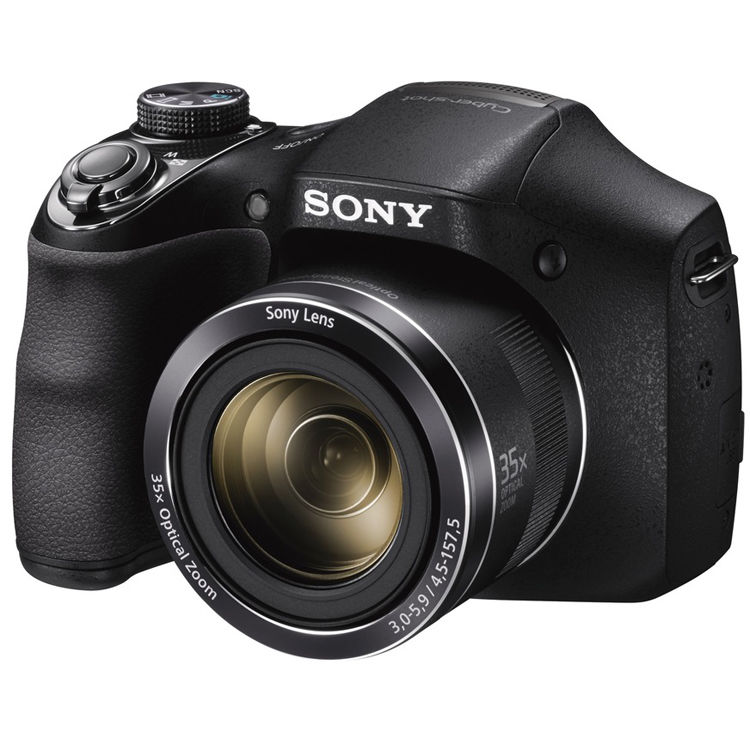
The dark Sony Cyber-shot DSC-H300 is an easy-to-use camera that comes with a 20.1 MP 1/2.3″ sensor.
This sensor is benefited by the incorporation of a long-arriving at 35x optical long range focal point, giving a 35mm-comparable central length scope of 25-875mm. For shooting in low-light conditions and when working at more noteworthy digital zoom amplifications, Optical SteadyShot picture adjustment is accessible to counter the impacts of camera shake.
For observing and playback of pictures, just as exploring the menu framework, a 3.0″ 461k-speck Clear Photo LCD is accessible and offers five brilliance steps to support seeing in splendid conditions.
There are additionally a large group of camera impacts to additionally refine the presence of your imagery including Picture Effects, Face Detection, Beauty Effects, 360° Sweep Panorama, and iAuto mode. Also, the H300 is controlled by 4 AA batteries.
It is the only camera that incorporates a 20.1 megapixel 1/2.3″ Super HAD CCD picture sensor to create high-resolution imagery that advantages from the 35x optical long-range focal point and Optical SteadyShot picture adjustment. Also, it has decent battery life.
The mix of these advances delivers sharp, point-by-point imagery reasonable for both printing and sharing on the web. The sensor additionally empowers HD video recording up to 1280 x 720 at 30 fps.
An implicit 35x optical long-range focal point gives a 35mm-comparable central length scope of 25-875mm, giving wide-point to super-fax viewpoints to suit most shooting circumstances. Supporting this current focal point’s long-range capacities is inherent Optical SteadyShot picture adjustment, which assists with reducing the presence of camera shake.
The design of the H300 emulates that of a DSLR, giving a simple to hold the body for expanded dependability when working with longer central lengths. A 3.0″ 461k-dab Clear Photo LCD screen is accessible for picture observing and audit and provisions five brilliance settings for more prominent ease of use in sunlit conditions.
Pros of Sony Cyber-shot DSC-H300:
- 20MP – 1/2.3-inch CCD Sensor
- One of the best point-and-shoot cameras
- 3″ Fixed Type Screen
- 1 fps continuous shooting
- Long Battery Life
- Optical Image Stabilization
- Manual Exposure
Cons of Sony Cyber-shot DSC-H300:
- No External Flash Shoe
- No Built-in Viewfinder
14. Kodak PIXPRO FZ53
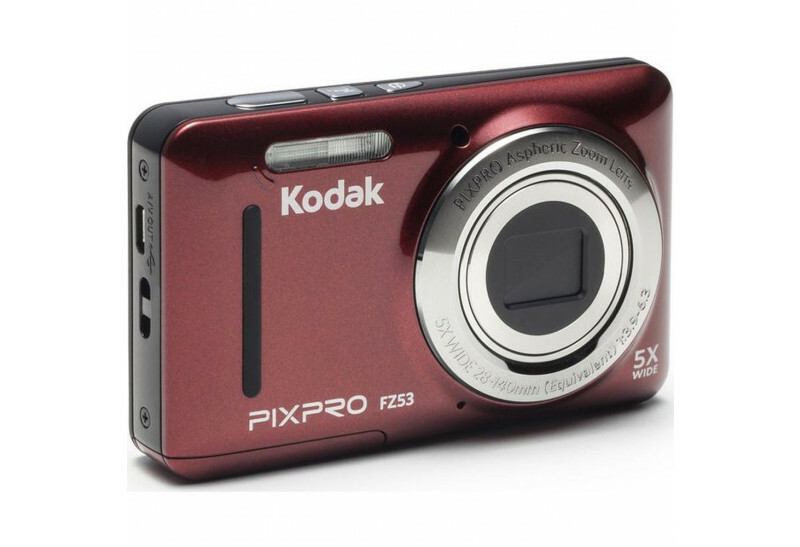
Spinning around a 16.15MP 1/2.3″ CCD sensor, this camera is equipped for creating high-resolution still images, alongside an affectability scope of ISO 80-1600.
The slim structure factor combines a 5x, 28-140mm comparable long-range focal point to cover wide-point to fax central lengths, and advanced picture adjustment helps this scope by limiting the presence of camera shaking.
Also, a back 2.7″ 230k-dab LCD screen is accessible for clear live view observing and picture playback; worked in glimmer can be utilized to enlighten low-light scenes, and the FZ53 is controlled by a battery-powered lithium-particle battery that can be helpfully charged in-camera.
A 16.15MP 1/2.3″ CCD sensor delivers high-resolution stills and HD 720p/30 video, alongside an affectability scope of ISO 80-1600 to suit working in an assortment of lighting conditions. A 5x optical long range focal point gives a 28-140mm identical central length range, covering wide-point to fax viewpoints, and 6x advanced zoom is additionally accessible to additionally expand the successful reach.
Digital picture adjustment is accessible to limit the presence of camera shake when shooting handheld in troublesome lighting conditions or with longer central lengths. The thin camera body joins a back 2.7″ 230k-spot LCD screen for creating and investigating symbolism, just as for exploring the menu system.
The included LB-012 battery-powered lithium-particle battery can be charged in this fun camera and gives roughly 200 group shots for each charge. Both single and multi, 9-point self-adjust modes can be utilized, and Face Detection AF is likewise accessible to focus on subjects’ appearances when shooting portraits. Face, Blink, and Smile Detection capacities can be utilized to help guarantee appropriately uncovered, centered, and all-around planned representations.
Pros of Kodak PIXPRO FZ53:
- An inexpensive and small camera
- Compact body
- Decent quality photo
- Rechargeable batteries
- Digital image stabilization
- 5x optical zoom lens
Cons of Kodak PIXPRO FZ53:
- Video limited to 720p
- No Wi-Fi
15. Kodak PIXPRO AZ252
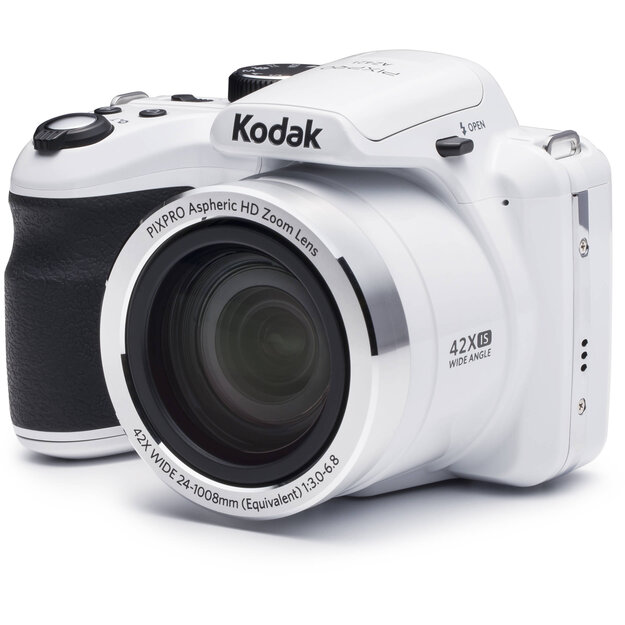
The white PIXPRO AZ252 Digital Camera uses a 1/2.3″ CCD sensor with an affectability scope of ISO 80-3200 to create pictures up to 4608 by 3456 pixels, just as HD movies at 30 fps. It is one of the best devices than other cameras.
This is supplemented by a far-reaching 4.3-107.5mm focal point, with a 35mm comparable central length of 24-600mm, that can create wide scene shots just as catch faraway subjects without losing resolution to advanced zoom measures.
An optical picture adjustment framework is incorporated into this best point and shoot camera to assist with keeping pictures sharp while shooting handheld, delivering better outcomes in low-light circumstances.
On the rear LCD of this fun camera is a 3-inch 230k-speck LCD show that permits you to see pictures while you shoot them and look through them after the catch. An inherent blaze is found at the top, with modes accessible for red-eye decrease and slow sync. So it is considered the best point and shoot cameras under 200.
Switch between 22 distinct scene modes for worked-on shooting, with alternatives accessible for firecrackers, the seashore, exhibition halls, and numerous different circumstances. The AZ252 is fueled by four AA batteries and saves pictures to a client-provided SD/SDHC card up to 32GB in limit.
Pros of Kodak PIXPRO AZ252:
- Optical Image Stabilization
- Great design
- Wi-Fi connectivity
- 16.15MP sensor
- Excellent low-light settings
- 25x optical zoom lens
- Fast file transfer
Cons of Kodak PIXPRO AZ252:
- Not satisfactory SD options
Frequently Asked Questions
Which is the best camera on a low budget?
If you are looking for low-budget cameras, then you can select Canon PowerShot ELPH 360 HS, Fuji FinePix XP90, Sony Cyber-shot DSC-W830, Kodak AZ361-WH PIXPRO Astro, Nikon Coolpix S7000, Canon PowerShot ELPH 190, etc.
What is the purpose of a point-and-shoot camera?
A film or digital camera in which the concentration and exposure are completely programmed. The client holds back nothing and presses the button; the camera wraps up. Simple-to-use cameras can go from modest expendables to stash measured digitals.
Is a point-and-shoot camera better than a phone?
Cell phones like the Huawei Mate 40 Pro (opens in new tab) could flaunt great powerful reach, however, most other camera telephones can’t match that. A few point-and-shoots, then again, were intended for extraordinary powerful reach and consequently protect subtleties in features and shadows significantly more.
How much does a decent camera cost?
The most fundamental digital cameras are simple to use, straightforward and fall short on capabilities — which cost somewhere in the range of $300 and $900. Mid-range digital cameras range from $800 to $3,500 (with focal point), and expert cameras and focal points can climb ordinarily higher.
How many megapixels is good for a camera?
A respectable 6-megapixel camera is sufficient for most typical camera use. Go for higher megapixels provided that you wish to involve your pictures for material measured prints or huge hoardings. If your advantage is in night sky photography, a higher megapixel camera can be significant.
Is Canon or Nikon better?
If we take a gander at the testing, we can see the reason why Nikon starts to lead the pack here. Its 46 MP versus Group’s 30, the immense number of centre places (153), and its dynamic reach and organizing capacities are deciding elements. Then again, analysing the very best DSLR cameras, a Canon model wins the opposition.
Is it worth buying a point-and-shoot camera?
If you’re attempting to take proficient or creative photographs that arrive beyond the limitations of a phone camera, a top-notch point-and-shoot camera may be your ideal choice. It’s about to cost you a touch of cash.
Do professional photographers use point-and-shoot cameras?
Professional photographic artists will generally utilize point-and-shoot models alongside their DSLRs. They love the way that it is convenient and simple to deal with. DSLRs might be an extraordinary catch in taking extraordinary photography however these cameras are outright tremendous.
How long does a point-and-shoot camera last?
They’re only not worked for long existences of standard use. I’m persuaded that ongoing digital point-and-shoots evaluated under $300 will work for a limit of three years before kicking the bucket. Fundamentally, for each $100 you spend up to $300 you’ll get one year of ordinary use.
What are the disadvantages of using a point-and-shoot digital camera?
There are some disadvantages of using point-and-shoot digital cameras like lower quality, limited control, absence of low light capacity, fixed focal point, restricted speed, short battery duration, and so on.
Final Words
It’s a real truth that the more you spend, the better quality camera you can hope to receive in return. However, if your financial plan is more than $200, then you can get more features rather than the cameras listed above.